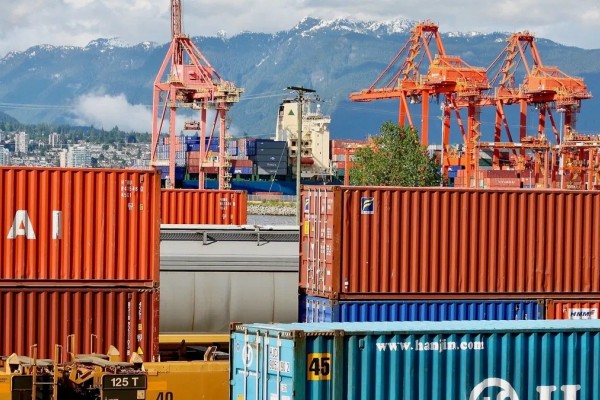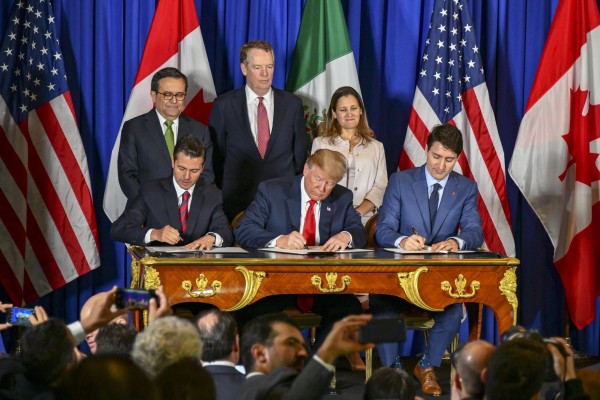Third Coast Pillory: Mexico, Neo-Nationalism and the Capitalist World-System

Photo by Ms. Phoenix
Mexico is dependent on the United States, as it is dependent on the global economy more generally. Neoliberal development scholars led them down the “global value chain” route, with upscalings and downscalings, with no real plan for actual, endogenous development. Because Mexican academics, business leaders, and politicians have made Mexico more dependent, the economy is not resilient to alterations in agreements made with larger, more powerful countries and transnational corporations. The policies the Mexican elite pursued were not beneficial for Mexico, but instead only to those who got fat off the blood and sweat of the Mexican working class exploited for pennies on the dollar.
President Enrique Peña Nieto’s statement, reacting to the Trump administration’s withdrawal from the Trans-Pacific Partnership and beginning to renegotiate NAFTA, demonstrates that the Mexican elite have no plan to confront the massive alterations in global trade that are currently occurring. Rather, the speech President Peña Nieto gave doubled down on the neoliberal world order, calling for more trade agreements into more diversified markets. This, despite its anemic results domestically, not to mention the global outlook. With growth only at approximately 2 to 3 percent post-recession, and 4 percent plus growth last time realized in 2012, Mexico is stagnating.
Currently, the Mexican Peso is losing value, making Mexico’s weak position relative to the US more and more apparent. This is a long-term trend, as Mexico has become more and more dependent on the global market, the peso has done exceedingly worse. It has gone from approximate 2 pesos to the dollar in 1988 to the now almost 22 pesos to the dollar. And while there was an initial increase in average earnings per month through privatization from roughly 200 dollars to 400 dollars, in actuality, global recessions left GDP per capita largely stagnant over the period. The majority of Mexico is not even working in the formal economy, with the informal economy expanding relative to Mexico’s neoliberal policies.
The fact is trade policy has benefitted transnational capital at the expense of Mexican workers. We have seen over the last fifty plus years the global economy grow from ten to seventy trillion dollars. That means, labor has gone from creating 10 trillion USD worth of wealth to creating seventy trillion dollars worth of it, the most massive expansion of things humanity has ever known. Yet, labor saw very little of what was created, especially if we think globally.

The horrid distribution of this wealth was not lost on the head of the Confederation of Mexican Workers, Carlos Humberto Aceves y del Olmo, himself complicit in the Institutional Revolutionary Party’s failed trade agreements. He repeatedly stated that the agreements failed because they did not distribute to labor the benefits and wealth that increased trade did produce. Instead, wealth was concentrated, going to fewer and fewer hands as workers were left to compete in a globalized labor market. Hence why more than half the country lives in poverty, even while productivity has gone up and the economy grew.
Thus, trade isn’t the problem per se, but how trade is negotiated, who trade benefits, and how the economy more broadly construed is distributed. That is, we have the same effect in both the US and Mexico. An elite negotiated trade agreements benefitting themselves at the expense of their populations. These are the same elite who now are claiming the mantle of nationalist to disguise their complicity. In more honest times we would say that the capitalist class battles over the correct role of the state in regulating markets to the advantage of the powerful. In that sense, the State, as Jason Allen would say, represents the balance of class forces. Simply put, the working class is losing.
As such, of course what is on offer is to continue the trade agreements. The Mexican elite see those trade agreements as enabling them to continue to access new avenues for profit, regardless if it benefits the Mexican worker. While there was nice talk from Juan Pablo Castañón of the Business Coordinating Council about the economy benefitting Mexican workers, it is baffling to believe such policy would come from the same sectors pushing anti-labor policies against teachers, workers more generally, and thus reducing working class power.
The nationalism on display, with its copied Trumpist slogan, “Mexico First”, turned worker interest into business interest, folding them in to Senate President Pablo Escudero Morales’ demand for a singular Mexican policy and interest. Because workers are not their own entity, they become a prop, and not an agent of history. They will be bargaining chips in the renegotiation, as has been the case with programs such as the Bracero program, where the Mexican government turned its citizenry into a low cost workforce for the US.
Mixed in to the nationalist proclamations were Secretary of Foreign Relations Videgaray’s repeated affirmations of Mexico’s benefit to the United States, such as jobs dependent on exports to Mexico, 500 billion USD in trade, and investment in the US. Altogether, there mix of statements was a bricolage, the kind of aesthetic politicians paint who are caught off guard. Their subservience to transnational capital has left them ill prepared for the neo-nationalist occupying the White House, a man who treats countries through the rhetoric of colonialist hierarchy and possession.
Further, and a serious problem globally, is how the Mexican ruling class plans to continue on this authoritarian neoliberal path with global trade declining by two trillion dollars. Either we are in a recession, or some other odd condition of the global economy is operating, because global GDP growth is stagnating at 2.6 percent and trending downwards over the long term, along with global GDP in decline, down from approximately 78 trillion to approximately 73 trillion. Notice, the last significant drop before this drop was the global recession of 2007-08.

We have seen these types of declines before. Chase-Dunn, Kawano, and Brewer, sociologists and World-System scholars, have demonstrated that dips in trade openness correlate to periods of heightened conflict. The last big dip correlates to the 1930s to 1940s period, when the world entered World War II, with the decline beginning in the 1900s leading up to World War I. As they ask, “whether sufficient legitimate consensus will be constituted (either around a new or renewed hegemon or an emergent global state) to prevent the world-system from entering another period of violent hegemonic rivalry of the sort that was seen twice in the twentieth century?” This is unanswerable, although current conditions don’t offer much hope.
As such, the Mexican President’s response, along with the cabinet, business, and labor, is largely detached from reality. Diversify to where? And, how do we resolve the business cycle not only being a boom-bust, but continuously doing worse in terms of recovery? Or, what is the plan to deal with workers’ stagnant salaries, poverty, and lack of employment? No discussion about redistribution, nothing about social resiliency, nada. If anything, this rapid response to Trump was defeatist, offering up slogans and platitudes for a bygone era.
In this new era certain policies should make a politician legitimate. First, a call for endogenous development controlled by the community for the benefit of the community. Second, universal social programs for health, education, housing, and retirement. Third, disaggregation of corporate power. Fourth, international working class unity. And this is just a starting point in a new era. But it is to recognize that if we wish to avoid a return to a world asunder, then we will need resilient, autonomous, egalitarian communities. What was on display was far from this. Rather, the Mexican elite are pushing an authoritarian neoliberalism, maintaining the worst of the old in the hide of the new.
Trump, Bannon, and the rest appear to have a plan to hoard, take, and berate. If this is Mexico’s response, Trump and Co. will surely trample as they see fit. In this new era, post-development, post-neoliberalism, in the age of neo-nationalist monsters and the coming anew of socialist affirmation, don’t be led astray by defenders of yesterday’s neoliberalism. It is obvious, they have no plan.
No looking back now, we have other worlds to midwife.
Andrew Smolski is a writer and sociologist.
This article originally appeared on Counterpunch.org.








_600_400_90_s_c1.jpg)

